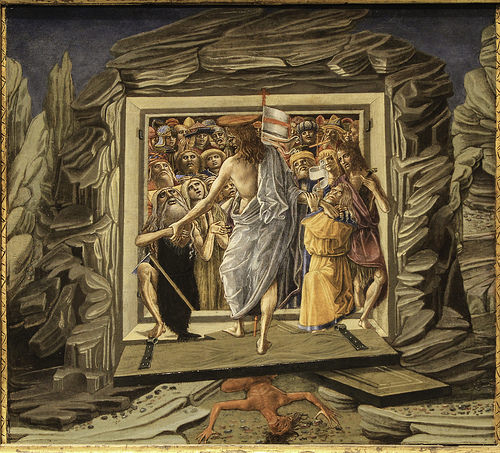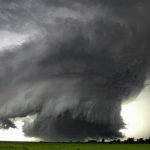We run our website the way we wished the whole internet worked: we provide high quality original content with no ads. We are funded solely by your direct support. Please consider supporting this project.

What Happened on the Cross?
Since the time of Anselm (11th century), and especially since the Reformation in the 16th century, the tendency of the Western church has been to focus almost all of its attention on the anthropological dimension of the atonement, usually to the neglect of the cosmic dimension that is central to the NT. In the standard Protestant view, the chief thing God was accomplishing when he had Jesus die on the cross was satisfying his perfect justice and thereby atoning for our sins. The work of the cross is centered on us.
While I do not minimize this aspect of Christ’s work, I cannot agree that the primary significance of the cross is found here. From the perspective of the NT, the anthropological significance of Christ’s death and resurrection is rooted in something more fundamental and broad that God was aiming at: to defeat once and for all his cosmic archenemy, Satan, along with the other evil powers under his dominion, and thereby to establish Christ as the legitimate ruler of the cosmos, and human beings as his legitimate viceroys upon the earth.
Whereas since Anselm the dominant way of thinking about the atonement focused on what it accomplished for humanity (reconciliation to God), and thus viewed what it accomplished against Satan and evil powers as a byproduct, the view that I espouse is that the NT construes the relation between these two aspects of the cross in the converse order. Christ’s achievement on the cross is first and foremost a cosmic event—it defeats Satan.
Thus as Scripture portrays the matter, the foundational reason Christ appeared was “to destroy the works of the devil” (1 Jn 3:8), to disarm “the rulers and authorities” (Col 2:15), and to “destroy the one who has the power of death, that is, the devil” (Heb 2:14). The consequence of this victory is that he is seated on his rightful throne, the whole cosmos is liberated from a tyrannical and destructive ruler, humanity is delivered “from the power of darkness and transferred … into the kingdom of his beloved Son (Col 1:13), and all who accept it are thereby reinstated to the original position and responsibility of stewards of the creation that God had always intended for us.
While Christ’s substitutionary death for sinful humans is central for understanding what Christ did for us, therefore, this dimension of Christ’s work is possible only because of the broader cosmic victory Christ won on the cross.
Through the death and resurrection of Jesus Christ, God stripped Satan and all levels of demons of all their power (Col 2:15). Therefore Christ now reigns in the power of God far above all such demonic powers. Expressing the tension of the “already/not yet” that characterizes the entire NT, Paul can say that “all things” are already “under his feet,” (Eph 1:21-22) though the actual manifestation of this truth is yet in the future. But the central point remains: the work of the cross was about dethroning a cruel, illegitimate ruler and reinstating a loving, legitimate one: Jesus Christ. When Jesus Christ is reinstated, all who are aligned with his rule, all who are “in Christ,” all who are his “bride” and part of his “body,” are reinstated to their appropriate position of authority as well. In a word, we are saved because he is victorious.
—Adapted from God at War, pages 240-246
Image by Lawrence OP via Flickr
Category: Q&A
Tags: Already Not Yet, Atonement, God, God at War, Jesus, Satan
Topics: Atonement and The Cross, Spiritual Warfare, Cosmic Conflict
Related Reading

Podcast: Why Did Jesus Need to Be Baptized?
Greg submerges himself in the topic of Jesus’ baptism. http://traffic.libsyn.com/askgregboyd/Episode_0078.mp3

Did Yahweh Crush His Son?
Though Isaiah was probably referring to the nation of Israel as Yahweh’s “suffering servant” when these words were penned, the NT authors as well as other early church fathers interpreted this servant to be a prophetic reference to Christ. Speaking proleptically, Isaiah declares that this suffering servant was “punished” and “stricken by God” (Isa 53:4,…

The Cruciform Center Part 1: How Matthew, Mark and Luke Reveal a Cruciform God
In the previous series of posts I’ve argued that a merely “Christocentric” approach to God is too general, as can be shown by the widely different conceptions of God people arrive at, despite their claim to be “Christocentric.” The confession that Jesus reveals what God is like is simply too abstract, for it leaves too…

Why Does God’s Activity Seem So Arbitrary?
Why? It’s the question that never goes away. Why is one infant born sickly and deformed when at the same time another is born perfectly healthy? Why does tragedy repeatedly strike one family while another seems to enjoy uninterrupted peace? On and on we could go with examples. It all seems so arbitrary and unfair.…

The Rorschach Test
The choices we make will either increase or decrease our ability to recognize light when we see it. As we choose goodness, we increase our capacity for goodness. What do you see when you read the Bible or look at God or interact with others? Everything is a Rorschach test to some extent, revealing the light…

How to Produce the Fruit of the Spirit
When the New Testament tells us to be loving, joyful, peaceful, kind and so on, it is not giving us a new set of behaviors that we are to strive to accomplish. Striving to attain them means nothing if they are sought as ethical ideals or to meet a set of religious rules. They have…
